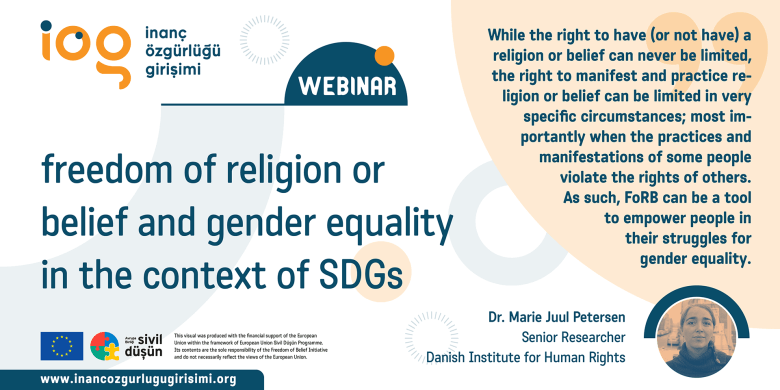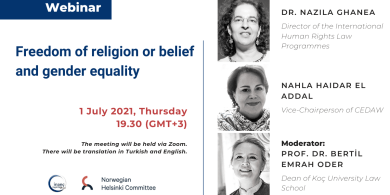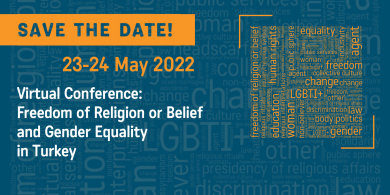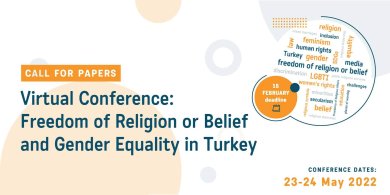Webinar: “Freedom of Religion or Belief and Gender Equality in the Context of SDGs”
“Freedom of religion or belief and gender equality in the context of SDGs” webinar, organized by the Freedom of Belief Initiative was held on 6th October 2021.

Moderated by Prof. Dr. Serpil Sancar, the webinar hosted Senior Researcher of the Danish Institute for Human Rights, Dr. Marie Juul Petersen and the Director of the Education Reform Initiative, Işık Tüzün.
On the webinar, Dr. Marie Juul Petersen touched on the findings of the report: “Promoting Freedom of Religion or Belief and Gender Equality in the Context of the Sustainable Development Goals: A Focus on Access to Justice, Education and Health” she prepared in 2019. The report aims to draw attention to the nexus between freedom of religion or belief (FoRB) and gender equality in the context of the sustainable development goals (SDGs). In the report, some of the most common types of challenges in the areas of health, education, and access to justice are identified and recommendations are presented to overcome the obstacles.
Petersen pointed out how these two human rights often are pinned against each other and viewed as if one were an obstacle in accomplishing the other. Yet, she highlighted that this (mis)perception of a conflict between the two is very often an understanding of FoRB as a right that protects religion – and often conservative, patriarchal religion.
According to Petersen, from a human rights perspective, FoRB is not about protection of conservative or patriarchal religious traditions and values. It can never be used to justify violations of women’s rights or other rights related to gender equality. While the right to have (or not have) a religion or belief can never be limited, the right to manifest and practice a religion or belief can be limited in very specific circumstances; most importantly when the practices and manifestations of some people violate the rights and freedoms of others. For this reason, she underlined that FoRB also can be a tool to empower people in the struggles for gender equality and non-discrimination.
The challenges that LGBTIs, women, girls and religious minorities face in terms of discrimination are often similar and countries with high limitations on FoRB are often the same countries with high levels of gender discrimination. Religiously based discrimination has certain gendered consequences, and gender-based discrimination has certain consequences for religious minorities, merging into new forms of discrimination. Therefore, it is this context Petersen wants to encourage further research and analyses as a resource.
Peterson also mentioned that, in the report, they present a range of recommendations and concrete ideas for a more comprehensive approach to FoRB and gender equality – both generally and in relation to the specific thematic areas that are analysed. And she emphasized the need for a nuanced, inclusive approach to religion and religious actors in efforts to promote FoRB and gender equality.
Işık Tüzün, Director of the Education Reform Initiative, discussed the challenges of the public education system in the Turkish context, based on the report’s overlapping issues on FoRB, gender equality and the 4th SDG – right to education. Tüzün, mentioned that the two human rights areas which are at the center of the report are also the areas reflect the traces of polarization in Turkey. This rooted separation, deepened by the State’s policies on FoRB and gender equality, poses an obstacle to come together and maintain a dialogue and cooperation atmosphere highlighted in the report. In addition to this, growing hate speech in Turkey, especially towards religious minorities and LGBTI communities, causes certain challenges to protect the rights of individuals belonging to these groups.
She particularly drew attention that children are often the ones whose experiences, demands and rights are the most invisible and the least heard. However, children’s right to participate means that their views on all matters that affect them requires consideration. Specially, children’s right to FoRB is often discussed more on the axis of rights of parents and this approach is needed to be challenged. Since the school environment and authoritarian and hierarchical relationships might amplify the challenges for girls, LGBTI children, children with religious minority or non-believer background, an additional study that focuses on children’s rights, could carry the report’s analyses forward.
Tüzün indicated that, despite the European Court of Human Rights’ judgments and many revisions regarding the curriculum, the compulsory religion course remains dominantly religious instruction, contains unobjective elements regarding some religions and beliefs. In a society with a significant diversity in terms of beliefs, this course is based on Sunni Islam. Other religions and faiths are presented from Islamic perspective. Moreover, there is not a non-discriminatory exemption mechanism.
According to Tüzün, since the Turkish curriculum does not focus on universal values sufficiently, it leaves room for the textbooks to have selected national values that might include sexist references and a lack of attention to gender issues and equality. Tüzün therefore, mentioned how it is important for Turkey to have a discussion on FoRB and gender equality, and open it up for youth and their perspectives, to strengthen the education system with a revised curriculum that respects both FoRB and gender equality and challenge other forms of discrimination by considering all rights and right holders. She pointed out the fact that different belief-groups also have different needs in society, that also requires a broader focus in the education sector.




